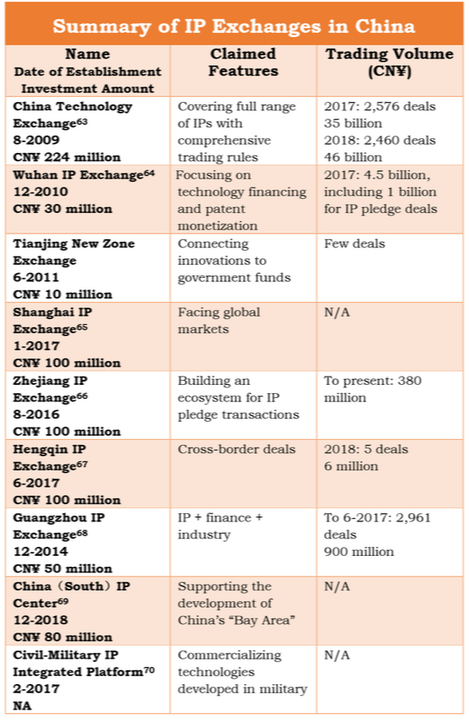Innovation and
|
IP Regime in ChinaIP Monetization in China
As an important platform for structuring IP monetization deals, an IP Exchange may facilitate IP’s circulation and value finding. A survey by SpringIP on 30 State-owned exchanges and ten private exchanges in China reveals their challenges and opportunities in the coming new era.
IP exchange is an important platform for IP monetization. The Chinese government has been promoting state-sponsored IP exchanges for decades. Up until 2020, around 24 exchanges have been approved by authorities at the provincial level or above. In July of 2019, SpringIP Group, an innovative company dedicated to fostering enterprise innovation through AI and big data, surveyed IP exchanges in China and obtained several insights. In short, these exchanges have not achieved their full capacity as expected so far. Still, new IP exchanges are being established year after year regardless of their unprofitability. The Sources of the Constraints The following may explain this phenomenon: First, to promote IP utilization and monetization, these exchanges are established in line with China’s national development plan. Like highways or railroads, they are built in anticipation of future traffic flow. In this case, profitability in the short term may not be the key goal. Second, these IP exchanges are vested with a public mission to monetize patents accumulated in previous years by research institutions and enterprises subsidized by the government. Although the number of these patents is large, their quality may not be well-received by the market, as it has learned to apply higher appraisal standards than before. Third, in more developed countries, sizable professional brokers facilitate IP transactions. At this stage in China, interdisciplinary experts who can handle both technology and business issues are still rare. The shortage of talent hinders the operations and the matching-up process of the exchange. IP exchanges are like hardware; they also need software, i.e., the services of fine-brokers, to keep the system running effectively. AI may be a solution to support IP exchange and professional brokers, but the market still needs time to fully apply AI in this field. Private Exchange as an Alternative? To fill the vacancy, privately-owned IP exchanges began entering this business a few years ago. In May 2016, KeYi Net62, one of the leading companies of this kind, reported an annual transaction volume of CN¥400 million. In 2019, the number of active privately-owned IP exchanges has increased to more than fourteen. How might such private platforms facilitate IP monetization in the future? The following two developments are important to monitor. First, the profit model of these privately-owned IP exchanges has not been proven. Whether the business model is sustainable largely depends on public awareness and recognition of the value of their services. Second, privately-owned IP exchanges will need a larger pool of quality IP in stock to achieve economies of scale. They need to wait for more IP to be created domestically or otherwise to import tradable IPs from other countries. Therefore, another development strategy is to equip themselves with the language and professional skills needed to access the global market to facilitate cross-border IP monetization transactions. This again calls for more talent with interdisciplinary training and, at the same time, opens a wide area of new opportunities for the players in this market segment. Dr. Jili Chung is currently working in Greater China. Jili is the founder of SpringIP Group, dedicated to foster enterprises’ innovation through AI and big data. Carlo Geremia at Nctm has contributed to this article.
0 Comments
Leave a Reply. |
Categories
All
|



 RSS Feed
RSS Feed
